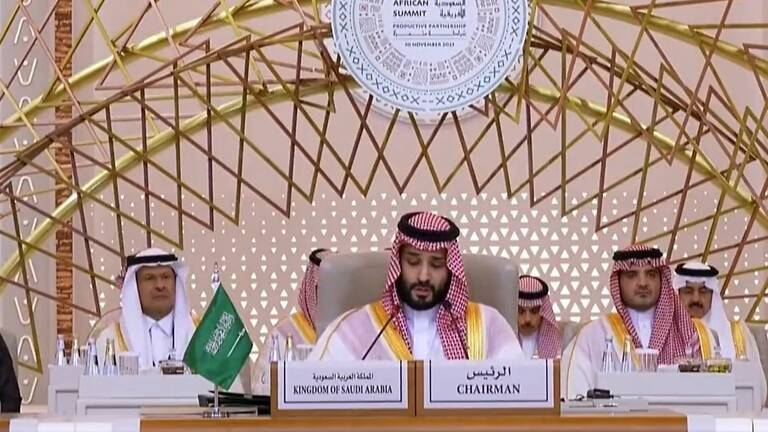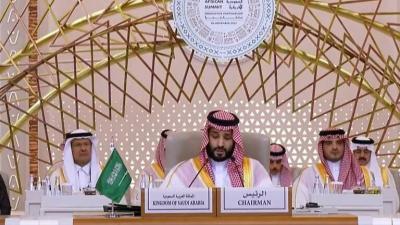During the African-Saudi summit held in the capital Riyadh on Friday, Saudi leaders and African nations reaffirmed their commitment to developing relationships and cooperation, establishing foundations for continental integration that shapes a sustainable future for the countries and peoples on both sides, in addition to "emphasizing the principle of the two-state solution and the Arab Peace Initiative."
Saudi Crown Prince Mohammed bin Salman called for an end to the war in Gaza, stating, "We condemn the military aggression in the Gaza Strip, targeting civilians and the continued violations by the Israeli occupation authority of international and humanitarian law." He added, "We emphasize the necessity to stop this war and the forced displacement."
He also announced the launch of the King Salman Development Initiative in Africa, which aims to initiate development projects worth over one billion dollars over ten years, supporting the African Union's bid for full membership in the G20. An additional five billion dollars will be provided as developmental funding for Africa by 2030. The Crown Prince also revealed that the Kingdom will increase the number of its embassies in the continent to over 40.
Saudi Arabia has repeatedly affirmed its rejection of the elimination of the Palestinian cause and the targeting of civilians in Gaza, considering that "the right to self-defense does not justify violating the law and overlooking the rights of the Palestinians."
At the conclusion of the summit, Saudi Foreign Minister Prince Faisal bin Farhan bin Abdullah announced the adoption of the "Riyadh Declaration," which serves as a roadmap for Saudi-African relations.
The Riyadh Declaration renewed the commitment to enhancing cooperation between African nations and the Kingdom of Saudi Arabia based on strategic partnership, common interests, and the historical and cultural ties shared by the African continent and Saudi Arabia. Saudi Arabia reiterated its historical ties with Africa and its interest in developing relations with all African countries in political, economic, investment, trade, developmental, cultural, and social fields.
African leaders praised Saudi Arabia's early support for the African Union's accession as a permanent member of the G20. The attendees discussed developments in Palestine, expressing grave concern over the humanitarian catastrophe in Gaza. They stressed the need to cease military operations in the occupied Palestinian territories and the necessity to protect civilians according to international law and humanitarian law.
They emphasized the critical role that the international community should play in pressuring the Israeli side to stop the attacks and the forced displacement of Palestinians from Gaza, which constitutes a flagrant violation of international humanitarian law. They affirmed the need to allow humanitarian organizations to provide aid to the Palestinian people, especially United Nations agencies, particularly the United Nations Relief and Works Agency for Palestine Refugees (UNRWA), and support its efforts in this regard.
The participants also highlighted the importance of ending the root cause of the conflict, which is the Israeli occupation, and the importance of intensified efforts to reach a comprehensive and just settlement to the Israeli-Palestinian conflict, according to the principle of the two-state solution and the Arab Peace Initiative, ensuring the Palestinian people's right to establish their independent state based on the 1967 borders with East Jerusalem as its capital.
The leaders affirmed the respect for the sovereignty of nations, non-interference in their internal affairs, and good neighborliness based on the principles of equality, mutual respect, and common interests among states according to international law, along with their determination to develop cooperation and coordination in defense, emphasizing unified efforts to combat terrorism and extremism in all its forms.
They discussed how to enhance cooperation and coordinate efforts, exchange expertise to serve and achieve mutual interests, contribute to global security and peace, and take all necessary measures to prevent terrorist crimes through close collaboration among states. They also highlighted the need to intensify cooperation in maritime security, which is fundamental to the stability and development of nations, contributing to enhancing and preserving marine environments and efforts to combat organized crime, drug trafficking, money laundering, human trafficking, piracy, and addressing the conditions of refugees and illegal immigration.
They acknowledged Saudi Arabia's accession and presidency of the focus group addressing African issues under the International Coalition Against ISIS alongside the United States, Morocco, Italy, and Niger, as well as its support for this group with a contribution of $2 million.
The participants recognized Saudi Arabia's efforts to establish the Council of Arab and African Nations bordering the Red Sea and Gulf of Aden. African leaders praised the level of trade relations between the Kingdom and African countries, amounting to $45 billion in 2022. They noted the importance of continuing efforts to enhance trade and economic cooperation and encourage joint investments through diversified trade, enhancing relations between economic institutions on both sides.
They emphasized the various economic components available to Saudi Arabia and the African continent and the opportunities offered by Saudi Vision 2030 and the African Agenda 2063 to bolster cooperation across various fields, which would yield mutual economic benefits. The leaders agreed to explore ways to activate and enhance joint cooperation in transport and logistics services, particularly in air and maritime transport, to achieve common interests.
They also agreed to strengthen economic relations in the industrial and mining sectors and increase non-oil exports.
In a bid to boost shared efforts with African nations to develop the digital economy and facilitate access to digital solutions, and reaffirming the Kingdom's leadership role in sharing significant successes from the private sector in digital government, the Kingdom launched, in cooperation with the "Digital Government Authority" and the "Digital Cooperation Organization," the Digital Market Initiative (Impact), which focuses on sharing successes in digital governance among countries, contributing to enhancing access to digital services, improving quality of life, and developing the digital economy. This initiative reflects the Kingdom's commitment to cooperating with African nations to enhance digital development, exchange expertise, and achieve sustainable development goals.




